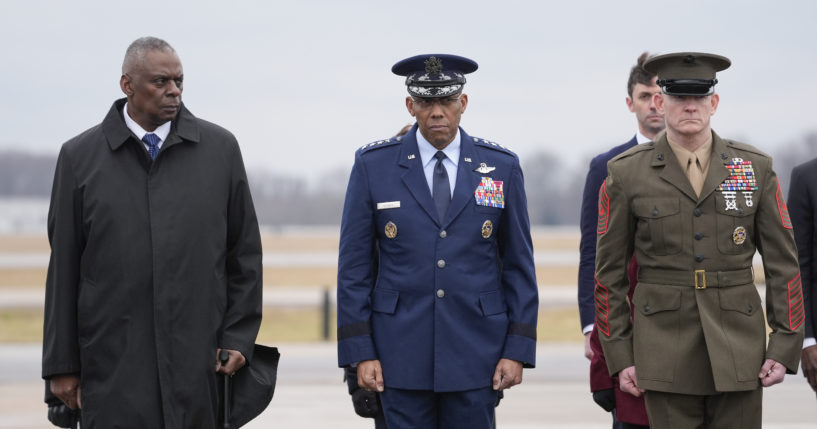
In Wake of US Airstrikes, Iranian-Backed Militia Official Hints at Desire to De-Escalate Conflict
An Iraqi militia official on Saturday hinted at a desire to de-escalate tensions in the Middle East following retaliatory strikes launched by the United States against dozens of sites in Iraq and Syria used by Iranian-backed militias and the Iranian Revolutionary Guard.
In an interview with The Associated Press in Baghdad, Hussein al-Mosawi, spokesperson for Harakat al-Nujaba — one of the main Iranian-backed militias in Iraq — condemned the U.S. airstrikes, saying Washington “must understand that every action elicits a reaction.” But he then struck a more conciliatory tone, saying that “we do not wish to escalate or widen regional tensions.”
Mosawi said the targeted sites in Iraq were mainly “devoid of fighters and military personnel at the time of the attack.”
Suggesting there wasn’t much damage could allow Mosawi to justify the lack of a strong response.
Syrian state media reported there were casualties from the strikes but did not give a number. Rami Abdurrahman, who heads the Britain-based Syrian Observatory for Human Rights, said 23 people were killed in the Syria strikes, all rank-and-file fighters.
Iraqi government spokesperson Bassim al-Awadi said in a statement Saturday that the strikes in Iraq near the Syrian border killed 16, including civilians, and there was “significant damage” to homes and private properties.
A U.S. official said Saturday that an initial battle damage assessment showed the U.S. had struck each of its planned targets in addition to a few “dynamic targets” that popped up as the mission unfolded, including a surface-to-air missile site and drone launch sites.
The official, who spoke on the condition of anonymity to provide details that were not yet public, did not yet have a casualty assessment.
Iraq’s foreign ministry announced Saturday it would summon the U.S. embassy’s chargé d’affaires — the ambassador being outside of the country — to deliver a formal protest over U.S. strikes on “Iraqi military and civilian sites.”
The air assault was the opening salvo of U.S. retaliation for a drone strike that killed three U.S. troops in Jordan last weekend. The U.S. has blamed that on the Islamic Resistance in Iraq, a coalition of Iranian-backed militias.
Iran, meanwhile, has attempted to distance itself from the attack, saying the militias act independently of its direction.
Iraqi spokesperson al-Awadi condemned the strikes as a violation of Iraqi sovereignty, particularly since some of them targeted facilities of the Population Mobilization Forces.
The PMF, a coalition of Iranian-backed militias, was officially brought under the umbrella of the Iraqi armed forces after it joined the fight against the Islamic State in 2014, but in practice it continues to operate largely outside of state control.
The Popular Mobilization Forces said in a statement Saturday that one of the sites targeted was an official security headquarters of the group.
In addition to 16 killed, it said 36 had been wounded, “while the search is still ongoing for the bodies of a number of the missing.”
The Iraqi government has been in a delicate position since a group of Iranian-backed Iraqi militias calling itself Islamic Resistance in Iraq — many of whose members also are part of the PMF — began launching attacks on U.S. bases in Iraq and Syria on Oct. 18.
The group described the strikes as retaliation for Washington’s support for Israel in the war in Gaza.
Iraqi officials have attempted behind the scenes to rein in the militias while also condemning U.S. retaliatory strikes as a violation of the country’s sovereignty and calling for an exit of the 2,500 U.S. troops in the country as part of an international coalition to fight IS.
Last month, Iraqi and U.S. military officials launched formal talks to wind down the coalition’s presence, a process that likely will take years.
One of the main Iran-backed militias, Kataib Hezbollah, said it was suspending attacks on American troops following Sunday’s strike that killed the U.S. troops in Jordan, to avoid “embarrassing” the Iraqi government.
Meanwhile Saturday, the U.S. military’s Central Command acknowledged it had had a series of skirmishes in the Red Sea and the Gulf of Aden with Yemen’s Houthi rebels. On Friday, the USS Carney shot down a drone over the Gulf of Aden, and there were no injuries or damage.
The United States also conducted airstrikes on four Houthi drones preparing to launch that it said “presented an imminent threat to merchant vessels and the U.S. Navy ships in the region.”
Overnight, F/A-18 fighter jets from the USS Dwight D. Eisenhower aircraft carrier shot down seven drones in the Red Sea, along with the USS Laboon.
The Western Journal has reviewed this Associated Press story and may have altered it prior to publication to ensure that it meets our editorial standards.
Truth and Accuracy
We are committed to truth and accuracy in all of our journalism. Read our editorial standards.
Advertise with The Western Journal and reach millions of highly engaged readers, while supporting our work. Advertise Today.










